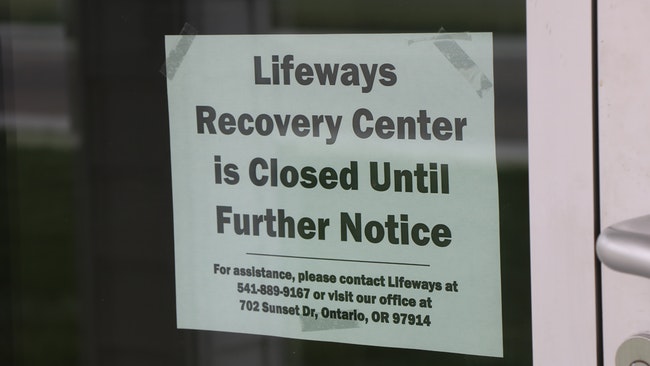
Lifeways laid off staff at its residential substance abuse treatment facility effective April 3. Employees were given a week to find new locations for clients. (The Enterprise/Yadira Lopez)
NOTE: The Enterprise is providing free access to its content related to the coronavirus as a community service. Subscriptions at $5 a month help the Enterprise keep this up.
ONTARIO – It took Israel Otteson a month of making calls to get a slot at the Lifeways Recovery Center. Then, two weeks into his treatment for substance abuse, he and the other clients at the facility were given a week to leave.
Lifeways Inc. laid off all staff at the residential substance abuse treatment facility and closed the building’s doors effective last Friday, April 3.
The inpatient clinic treats people struggling with addiction and mental health issues. Taxpayer money covers the three-month stay at the facility and clients commit to counseling and other services meant to help them overcome addiction. Many clients are homeless or referred to the clinic by jails and probation officers.
In a letter to community partners, the organization blamed COVID-19 for the decision to close the facility for an undetermined amount of time. But the center’s staff members say they were blindsided by the move.
Employees said company administrators were actively pressuring clinicians to take in more clients up until the day they were laid off. The move to instead close the facility was seen by some employees as retaliation after they shared concern that taking on new clients now would put staff and current clients in danger.
After the closure, Lifeways said in a statement that the safety of clients and staff is “of utmost importance and we took their concerns seriously.”
“After thorough review of our current facility we determined that we are not able to follow CDC guidelines for infection prevention,” Liz Johnsen, Lifeways chief operating officer, wrote in an email.
Following interviews with other employees, the Enterprise provided written questions. The company didn’t address specific questions but instead provided a general statement.
“Out of respect for all parties involved, we would like to refer you back to our earlier response,” Johnsen wrote.
“We get people who have given up on life and they’re in a fragile state,” said Randall Llanas, a counselor who was laid off from the residential facility. “And we told all those people in that fragile state to pack their bags.”
Employees said that before they were laid off, they tried to work with administrators to delay the intake process and focus on the roughly 21 clients that were still in the facility.
But they said they were met with resistance and were told repeatedly that the facility would need at least 31 clients to pay for staff wages and that employees needed to continue taking in new clients. Several clients had voluntarily left over fears for COVID-19.
Annette Serrano, a supervisor at the facility, said the push to keep bringing clients in remained until the morning of Friday, March 27 – the day employees were told they were laid off.
“That morning I got asked if we had intakes set up,” Serrano said.
Administrators were told there were no new people yet and according to Serrano, directed the clinic to begin taking in new clients the following Monday.
“We tried several times on different occasions to talk to them and let them know we were afraid of them having us bring more clients in because our clients come from the other side of the state,” said Pearl Apodaca, a counselor since 2014 who is now out of a job.
As directed, employees had drafted a revised intake procedure with guidance on how to accept new clients during the pandemic. Serrano said the document was completed a day before they were laid off, but there was no chance to present it to administrators.
The procedure included limiting clients from heavily infected counties in the western part of the state, and requiring that new clients came in exclusively from detox clinics or jails where they had been closely monitored for symptoms.
Employees said they pleaded with administrators to continue caring for the current clients without shutting down the facility.
“We wanted to focus on who we had in the building. We were worried because the areas we draw from are Portland, Salem and Eugene and they were all being hit with this COVID, so what the employees talked about with each other was taking the time to reevaluate and hold off [on new clients] but take care of who we had inside the walls,” Llanas said.
Employees hesitated to bring in more clients for logistical reasons, too, he added. They were worried about running out of food or toilet paper.
“We asked every time we met with them, can we just take care of who’s here and just see how it goes. Even week by week, let’s just slow it down,” Serrano said.
“I’ve been doing this kind of work for 23 years,” Serrano said. “The way that Lifeways treated staff, and clients especially, is an absolute travesty and it could’ve had really bad outcomes for clients.”
Clients pulled from a program mid-treatment could potentially relapse, Serrano said. The sudden stress, particularly in the middle of a pandemic, could lead to suicide or long-term devastating outcomes, she added.
 Lifeways Recovery Center is located at 686 NW 9th Street. (The Enterprise/Yadira Lopez)
Lifeways Recovery Center is located at 686 NW 9th Street. (The Enterprise/Yadira Lopez)
Otteson moved into the clinic in mid-March from Umatilla County. Homeless, he said he would be out on the streets again if employees hadn’t found him an alternative location last week.
“When I came here, I was ready to end it all,” Otteson said.
He filed a formal complaint with Greater Oregon Behavioral Health Inc., and the Oregon Health Authority.
“I would happily take any risk with COVID-19 in order to maintain and progress in my life-or-death struggle with addiction,” he wrote in his grievance.
“I signed a contract of care with my counselor for 90 days or more of intensive treatment,” he added. “I know that some things like COVID-19 are beyond the control of Lifeways, but I also believe that this decision was made without consideration to all possible options.”
Employees and clients were given a one-week notice that the program would be closing.
According to Oregon Administrative Rules, a program planning to discontinue services must provide individuals 30 days written notice.
Staff had seven days to discharge the remaining clients and find them new locations and transportation. That was no easy feat, employees reported.
Many facilities around the state aren’t adding clients at this time, Serrano said, or they have strict requirements similar to the ones that the Lifeways clinic staff wanted to impose to avoid infections.
The discharge process usually takes about 30 days and involves ensuring that clients get into stable housing. Staff worked since March 27 to place about a dozen remaining patients in other locations. Llanas and Apodaca on Thursday, April 2, drove the last client to a new facility.
Tim Hoekstra, Lifeways chief executive officer, said in a letter to the community that the organization would continue to provide outpatient treatment to clients during the pandemic.
“What that will entail is Level I outpatient treatment to include telehealth/telephone individual therapy along with telehealth/telephone group therapy. We will include resources for our clients to access online self-help meetings, 12-Step meetings, religious services, etc.,” Hoekstra wrote.
Llanas, the counselor, said closing the clinic removes a needed resource in Malheur County.
“To close something like this where we’re trying to get people help, I think all that does is add one more thing that Malheur County lacks,” he said.
Joni Mansfield, an employee of nearly 11 years at the facility, sent an email to all Lifeways employees the Wednesday before their last day of work.
“I’m saddened that it’s closing its doors and the way we were all let go and retaliated against,” wrote Mansfield, who was also laid off. “At least that is how its felt for all of us. We have worked very hard and compassionately, and am paying the price for expressing our concerns the last couple weeks.”
The email accounts of laid off employees were shut down shortly after.
HELP THE COMMUNITY GET THE FACTS….
As long as we can, the Malheur Enterprise will provide free access to all stories related to COVID-19. With businesses closed and not advertising, community support for this service is vital. Help one of two ways:
SUBSCRIBE – $5 a month, automatically.
DONATE – to our LOCAL NEWS FUND. Tax deductible, and anonymous if you wish.
Thank you!




